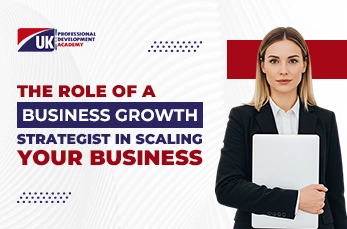In 2026, employee growth and development will become a crucial component of building a successful business. In a world shaped by rapid digital transformation, remote work trends, and changing workforce expectations, organisations that invest in their people stay ahead. But how can leaders genuinely empower their teams in this evolving landscape?
If you’re a manager, business owner, or team leader looking to support your employees’ personal and professional development, this guide is for you. In this guide, you will get to know 7 employee growth and development ideas that forward-thinking leaders should adopt in 2026.
Why is Employee Growth and Development Important?
Employee growth in a company is not just about promotions; it’s about building a workforce that’s skilled, engaged, and prepared to face future challenges. When employees acquire new skills, gain confidence, and feel supported, they tend to perform more effectively in their roles. This leads to higher productivity, better teamwork, stronger business results, and increased job satisfaction.
In fact, a recent study shows that 76% of employees are more likely to remain with a company that provides continuous training and development. In 2026, when industries are changing quickly and new technologies are emerging, helping employees grow is not just a good idea; it’s necessary for staying competitive. Simply put, when your people grow, your business grows too. That’s why smart companies are focusing on employee development strategies to stay ahead of the competition.
7 Employee Growth and Development Ideas for Leaders in 2026
Supporting employee engagement and growth has become one of the most important responsibilities for modern leaders. In 2026, creating a culture of continuous learning and growth is key to keeping teams engaged, skilled, and ready for future challenges.
Here is how to develop staff in the workplace through seven effective strategies:
Personalised Learning Plans
In today’s diverse and rapidly changing workplaces, a one-size-fits-all approach to training is no longer effective. Employees come from different backgrounds, generations, and career stages, each with unique goals and learning preferences. That’s why personalised learning plans are essential. Leaders can create meaningful career development opportunities for employees by actively understanding each employee’s strengths, interests, and areas for improvement.
This could involve one-on-one planning sessions, using feedback tools to assess skills, and offering a variety of learning formats such as microlearning, online courses, mentoring, and hands-on training. It’s also important to ensure that these learning goals are aligned with both the individual’s career path and the organisation’s objectives. Tools like LinkedIn Learning or an internal Learning Management System make it easier than ever to build custom learning paths that keep employees engaged and motivated to grow.
Cross-Functional Training
How to develop employees’ skills? One powerful method is cross-functional training. Cross-functional training is an effective way to help employees develop new skills and become more adaptable in their roles. When employees learn about other departments, they improve communication, strengthen teamwork, and boost overall productivity.
You can start by rotating employees between departments for short periods, encouraging job shadowing, or offering temporary projects in other roles. Regular knowledge-sharing sessions where different teams explain what they do are also helpful. This kind of training not only keeps employees engaged but also creates a more flexible and well-rounded workforce that can handle change more easily and support the company in new ways when needed.
Establish a Mentorship Culture
Creating a strong mentorship culture in the workplace is a powerful way to support professional growth initiatives. Mentorship helps employees learn faster, feel more confident in their roles, and build stronger connections within the company. It also plays an important role in improving employee retention and preparing future leaders. One effective way to start is to pair new employees with experienced team members during onboarding to help them settle in.
You can also launch formal mentorship programmes across different departments or levels. A great idea to try is reverse mentoring, where younger staff members share their digital knowledge or fresh ideas with senior employees, benefiting both sides. Mentors and mentees both grow and learn, making it a valuable experience for everyone involved.
Offer Real-Time Feedback and Coaching
In 2026, waiting for yearly performance reviews will no longer be effective. Today’s employees want regular, helpful feedback that helps them grow in real time, not months later. That’s why offering continuous feedback and coaching is so important. When managers give timely and clear guidance, it helps employees improve quickly and feel more supported in their roles.
To make this work, train managers to share feedback often, whether after a project, a meeting, or even a small task. Utilise digital tools to track progress and performance, ensuring feedback is based on accurate data. It’s also helpful to encourage peer-to-peer feedback, where team members can support each other. And don’t forget informal coaching. Simple things can make a significant difference in employee growth and confidence, such as offering tips after a presentation or suggesting improvements during daily tasks.
Collaboration and Communication
In 2026, strong communication and teamwork are more important than ever, especially with many employees working remotely or in hybrid roles. A connected and collaborative team creates a positive work environment where people feel heard, respected, and motivated. When employees can easily share ideas and give feedback, they become more engaged and productive.
Leaders can support this by encouraging open discussions during meetings and creating a safe environment for everyone to speak up. Using tools like Slack, Microsoft Teams, or Zoom helps teams stay connected and work efficiently, even from different locations. It’s also helpful to offer simple training on communication skills, such as active listening and emotional intelligence, so team members can better understand and support one another.
Bringing teams from different departments together on shared projects builds stronger relationships and improves cooperation across the company. And don’t forget to celebrate group achievements; recognising teamwork boosts morale and inspires others to do the same.
Productivity and Time Management
In the busy and tech-driven work environment of 2026, managing time effectively is more important than ever. With many employees working remotely or juggling multiple tasks, it’s easy to feel overwhelmed. That’s why teaching good time management skills is essential. When employees learn how to organise their day, set clear goals, and focus on priorities, they become more productive, less stressed, and enjoy a better work-life balance.
Encourage your team to set daily or weekly goals and use tools like Trello, Asana, or Notion to stay on track. Most importantly, when leaders manage their time well, it inspires the whole team to do the same. Focusing on results rather than hours worked also builds a culture where people feel motivated to work smarter, not harder.
Leadership Skills
Developing leadership skills can benefit employees at every level. In 2026, companies value employees who can take charge of projects, support their teammates, and handle challenges with confidence. That’s why building leadership skills is so important. It helps employees communicate clearly, make smart decisions, and take initiative in their roles.
Organisations can offer leadership in employee training, focusing on areas such as problem-solving, emotional intelligence, and team management. You can also give employees opportunities to lead meetings, manage small projects, or mentor junior staff. Regular coaching and feedback will help them improve their leadership style over time.
Final Thoughts
Using the 7 Employee Growth and Development Ideas for managers in 2026 can help you empower your team to reach new heights. Prioritise their growth and discover their potential to drive business success like never before. Creating a culture of learning and development not only attracts top talent but also ensures that employees stay loyal, motivated, and high-performing. So, if you’re wondering how to upskill employees and keep them engaged in 2026, start here. Invest in your people, and watch your organisation thrive.
















